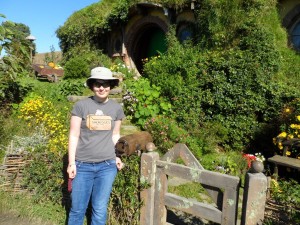Khoury News
Dreams and Nightmares, New Zealand to Germany
Pick a word. Now, make a video game built around that word. That was one of the assignments senior Martha Hamlin was tasked with in her Rapid Idea Prototyping course. […]

Pick a word. Now, make a video game built around that word.
That was one of the assignments senior Martha Hamlin was tasked with in her Rapid Idea Prototyping course. Her word was “dream.” She built a game in which players had to complete a puzzle chain that involved switching between dream and nightmare states.
“You had to find a bunny and give it a carrot so you could pick it up,” Martha says. “Then you could bring it into the nightmare zone and it would become a little monster which you gave to a boy who wanted a pet. He would give you a doll and you'd bring that back and give it to a girl on the dream side who wanted a doll.”
That class was a favorite of Martha’s, who is studying game design and computer science. Even in her computer science coursework, the class she enjoyed the most was one that allowed her to create a digital tool to help compile information that tabletop gamers would ordinarily write on note cards, which are easily lost or disorganized. In that Human Computer Interaction course, students had to prototype and test their interfaces, a process that Martha enjoyed.
“It was really interesting to learn all the elements that go into making a user interface that people will understand quickly and interact with well,” she says. The need to create something that users will grasp almost instinctively is of equal importance when creating games, she says. “In games, you're essentially having to teach people mechanics constantly. A game is teaching people how to play the game while they're playing it.”
A desire to understand how to teach led her to enroll in a psychology of education elective while studying abroad in New Zealand at the University of Canterbury in Christchurch. While Martha did take one computer graphics course there, she focused more on learning about New Zealand and its culture, both through the classes she signed up for and through travelling around the South and North Islands – including a stop at where the hobbits of Lord of the Rings live. She says that a Maori and Indigenous Cultures in Film class taught her valuable lessons that can be applied to creating games, namely in how to represent diversity with tact: “It's still applicable with games in how you represent different cultures other than your stereotypical white male.”
After that study abroad experience, Martha knew one of her two co-ops would have to be abroad. She just wasn’t expecting that it would be her first, or that she would end up in Berlin. While at Wooga, a mobile game company based in Germany, Martha was a game programmer working on a 14-person team creating a mobile action shooter game.
Her second co-op, at Hasbro in Pawtucket, was also game-driven, and focused on creating games that cross the digital/physical boundary. An example is a Transformers app that has corresponding physical toys that, when scanned, unlock features in the digital game. Martha did not work on that app, although she was in the same department that produced it.
“In a way, it's free to play games for kids because you don't really want kids to play a game where they put in their parents' credit card info and then buy piles of stuff,” Martha explains. “Instead, your parents buy you a toy and you get to play with the toy and also get something in the app.”
When she graduates in May, Martha won’t be staying in Boston. She’s heading back to Berlin to join Wooga as a full time game programmer. Her first day will be June 1.
“I'm very excited,” she says. “It's also nerve-wracking. Finishing college, no matter what, is going to be stressful. Moving to a different city is going to always be stressful. Moving to a different country on another continent...plane tickets, shipping stuff. There's so much stuff to do.”